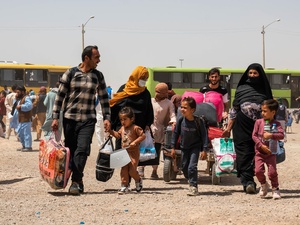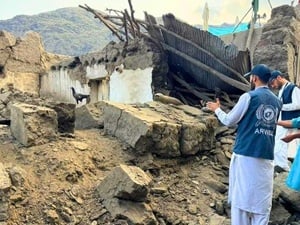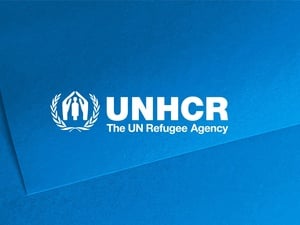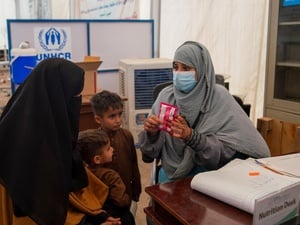Afghanistan Humanitarian Update No. 52
Afghanistan Humanitarian Update No. 52
13 February 2002
At a Glance:
- Fresh Afghan arrivals in Pakistan
- Spontaneous returns top 143,000
- UNHCR steps-up repatriation assistance
Fresh Afghan arrivals in Pakistan
Some 30,000 new arrivals have been registered since the first of the year in UNHCR refugee camps near Chaman, Pakistan. They cite a number of reasons for leaving, including insufficient supplies of humanitarian aid in some parts of Afghanistan, banditry and insecurity.
On Wednesday, UNHCR staff at the Killi Faizo transit site at Chaman registered some 1,500 persons as part of a continuing exercise. The desperate Afghans arriving at Chaman over the last six weeks bring property and other personal effects. Families interviewed by UNHCR on Wednesday spoke of bandits stealing their animals, including one woman whose last 14 sheep were taken.
Several thousand people remain outside the Killi Faizo site in a makeshift waiting area, where the UN supplies water and biscuits and distributes blankets as protection against the cold. Some families wait as long as two weeks in the border zone before being registered and allowed into one of the nearby UNHCR-run camps. Pakistan authorities continue to respond to the humanitarian plight of Afghans arriving at Chaman, but clearly more must be done inside Afghanistan to alleviate the reasons for this fresh exodus.
It is important that relief agencies boost their presence in Afghanistan and that, particularly in the north, aid agencies work to ensure that relief is reaching remote areas. UNHCR also believes that donors must fully support the efforts of the Interim Authority in Kabul to establish its presence across the country. UNHCR this week dispatched staff from its Kabul headquarters to further examine the situation facing minority communities in the north of the country.
Spontaneous returns top 143,000
UNHCR staff monitoring some of Afghanistan's border crossing points with neighbouring Iran and Pakistan have recorded the spontaneous return of more than 143,000 Afghans since 1 January. Some 30,000 Afghans have returned via the Islam Qala crossing point, staff on Afghanistan's western frontier with Iran report, while another 113,000 have crossed homewards over Pakistan's Chaman and Torkham crossing points.
Most of these spontaneous returnees are from Afghanistan's minority ethnic communities - principally ethnic Tajiks. Many of the spontaneous returnees over the past weeks are single men who apparently regularly return home regardless of developments inside Afghanistan.
Iran and Pakistan together shelter some 3.5 million Afghan refugees. Government officials in both countries report that the number of Afghans in their countries is much higher than the UN refugee agency estimates, but they include many individuals living outside the UN's assistance channels.
According to spot surveys among the spontaneous returnees entering Afghanistan at the Torkham crossing point, the vast majority have some education, with 17 percent educated at the university level while 28 percent have a secondary school diploma. This wave of returns indicates a vote of confidence in Afghanistan's future as these educated exiles opt to try life back home.
Not all returnees have been spontaneous: neighbouring countries continue to deport small numbers of Afghans, with more than 400 persons deported from Pakistan during the first month of 2002, and a similar number returned by the Iranian authorities. Most do not appear to be refugees, but rather single men possibly working in the informal labour sector, UNHCR's border monitors report. UNHCR opposes the deportation of Afghans by any country at this time, due to the precarious security situation inside Afghanistan.
UNHCR steps up repatriation assistance
Beginning in March, UNHCR plans to step up assistance to those Afghans who wish to spontaneously repatriate to their shattered homeland, despite the still-precarious security situation in some areas and challenges due to the drought and devastated economy.
From 1 March, UNHCR staff posted at the Torkham crossing plan will scale up assistance to refugees opting to spontaneously repatriate despite the still-unsettled situation in many parts of Afghanistan. UNHCR will open an encashment centre at Jalalabad where Afghans who previously registered their willingness to spontaneously return will receive $100 per family to help finance their transport homewards.
UNHCR staff based in southern Afghanistan's Kandahar Province will similarly assist spontaneous returnees crossing from Chaman, Pakistan, and distribute travel grants also beginning in March. By 1 April, UNHCR plans to staff crossing points located along on Afghanistan's western border with Iran, so that refugees there can also benefit from the cash grant during the new phase of the assistance operation.
During this new phase, spontaneous returnees will also receive relief kits including 150 kg of wheat from the UN's World Food Programme, two plastic tarpaulins, two jerry cans/water buckets, two blankets, a kerosene lantern, 15 bars of soap, women's sanitary material, a mat, and a tool or agricultural kit. UNHCR staff will record data about their destination so as to possibly include them in the distribution of additional shelter assistance later in the year.
UNHCR has signed an agreement with the German relief agency GTZ to assist with the facilitated return programme: GTZ is preparing distribution centres inside Afghanistan where spontaneous returnees in need of UNHCR relief aid will collect their returnee packages. By early March, GTZ plans to have 16 distribution centres open inside Afghanistan, and 32 centres - one in every province - should be operational by 1 April to help ensure that Afghans opting to go home will have the agency's standard assistance package.
In many cases, Afghans opting to return may need to rebuild their homes entirely. UNHCR plans to order timber beams from outside Afghanistan to distribute in the coming months to help with shelter rehabilitation. Another local resource under consideration is the production of concrete beams by income-generating projects.
While assisting Afghans who opt to repatriate, UNHCR is not yet promoting return to war- and drought-stricken Afghanistan. Afghan officials in the ruling Interim Authority have appealed to states hosting Afghans to adopt a gradual approach towards return. They caution against a rush to return Afghans while the situation is so precarious, with insecurity in many parts of the country and the economy and agricultural sectors in shambles.








